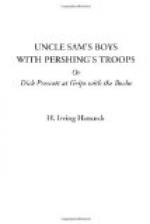“When?”
“Last July.”
“Where did you send the letter?”
“To you at Camp Baker.”
“It was in July that we left Camp Baker for Camp Berry. Your letter must have gone astray. I heard from the old home town of Gridley that you and Hazelton had gone across—–something to do with welfare work. I couldn’t make it out,” Dick hurried on,” neither did I know where to address you.”
“That’s just it, though!” exclaimed Tom Reade, with a happy laugh. “Welfare work explains it to a dot. We’re working for the welfare of the world by helping to kill as many Huns as possible!”
“But how came you to be here?”
“I might ask as much of you, Dick, as you and I appear to be in exactly the same boat.”
It looked rather ungrateful toward the old peasant who had brought these old, old friends together, but for a few moments both forgot him. When they remembered him they found that the old man had gone, closing the door.
Then Dick told what had befallen him, after which Reade explained that, three nights before, on a night flight over the German lines, his plane had been damaged by a fragment of shell from an anti-aircraft gun. Reade had been obliged to descend some forty miles behind the German front lines. Fortunately he had come down in a field near the house in which he now hid. He had cautiously come to this house, and as cautiously aroused the inmates, reasoning that they must be French and should befriend him. This the peasants had cheerfully done.
“I’ve been hiding here since, and my machine was found, but I wasn’t,” Tom wound up.
“You see, this room has no windows, and I keep very quiet, and so, perhaps, I could remain here safely a month. But I won’t. I have plans for escape back to the French lines.”
At this moment the door opened again. The old peasant came in with a tray on which was a dish of smoking meat, dark bread and potatoes and a pot of coffee.
“Now, since you are old friends I shall leave you,” said the old man smiling, as he patted both young Americans on the shoulder. “But Monsieur Reade knows how to call me if I am wanted. Good rest and stout hearts, young gentlemen!”
“We’ll feast a bit!” cried Prescott eagerly.
“You will,” Tom corrected. “I’ve had my evening meal and am not hungry. Eat before the candle burns out, and while you do so I will fix the ventilator for the night. When you have eaten we can turn in on the bed, for we can talk there as well as when sitting in the dark.” Dick fell to ravenously on the food and coffee, while Tom attended to ventilation by removing a loose brick from a chimney, half of which was in this blind attic.
“We must pay this peasant well,” Dick proposed, when he had nearly finished the meal, “for I’ll wager he is not rich.”
“I can pay him all right,” declared Reade, striking a hand against his waist-line. “In my money belt I have a stock of American gold. Gold is a money that is very popular in Europe in these days of hardship.”




